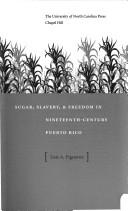| Listing 1 - 8 of 8 |
Sort by
|
Book
ISBN: 1469602598 0807869090 0807835056 1469619040 9780807869093 9781469602592 9780807835050 9798890882820 9781469619040 Year: 2011 Publisher: Chapel Hill
Abstract | Keywords | Export | Availability | Bookmark
 Loading...
Loading...Choose an application
- Reference Manager
- EndNote
- RefWorks (Direct export to RefWorks)
For black women in antebellum Charleston, freedom was not a static legal category but a fragile and contingent experience. In this deeply researched social history, Amrita Chakrabarti Myers analyzes the ways in which black women in Charleston acquired, defined, and defended their own vision of freedom. Drawing on legislative and judicial materials, probate data, tax lists, church records, family papers, and more, Myers creates detailed portraits of individual women while exploring how black female Charlestonians sought to create a fuller freedom by improving their financial, social, an
African American women --- Freedmen --- History --- Social conditions --- Charleston (S.C.) --- Race relations --- Ex-slaves --- Freed slaves --- Afro-American women --- Women, African American --- Women, Negro --- City of Charleston (S.C.) --- Slaves --- Women --- Charles-Town (S.C.) --- Freedpersons --- Freed persons --- Ex-enslaved persons --- Freed enslaved persons --- Enslaved persons
Book
ISBN: 1469604272 0807895784 9780807895788 9781469604275 9780807833629 0807833622 9780807871041 0807871044 Year: 2009 Publisher: Chapel Hill
Abstract | Keywords | Export | Availability | Bookmark
 Loading...
Loading...Choose an application
- Reference Manager
- EndNote
- RefWorks (Direct export to RefWorks)
A moving narrative that offers a rare glimpse into the lives of African American men, women, and children on the cusp of freedom, First Fruits of Freedom chronicles one of the first collective migrations of blacks from the South to the North during and after the Civil War. Janette Thomas Greenwood relates the history of a network forged between Worcester County, Massachusetts, and eastern North Carolina as a result of Worcester regiments taking control of northeastern North Carolina during the war. White soldiers from Worcester, a hotbed of abolitionism, protected refugee slaves
African Americans --- Freedmen --- Migration, Internal --- Internal migration --- Mobility --- Population geography --- Internal migrants --- Ex-slaves --- Freed slaves --- Slaves --- Afro-Americans --- Black Americans --- Colored people (United States) --- Negroes --- Africans --- Ethnology --- Blacks --- Migrations --- History --- Social conditions --- Worcester (Mass.) --- United States --- Worcester (Mass. : Town) --- Quinsigamond (Mass. : Plantation) --- Social aspects. --- Freedpersons --- Black people --- Freed persons --- Ex-enslaved persons --- Freed enslaved persons --- Enslaved persons
Book
ISBN: 030016646X 9780300166460 1306168309 9781306168304 9780300163872 0300163878 Year: 2013 Publisher: New Haven Yale University Press
Abstract | Keywords | Export | Availability | Bookmark
 Loading...
Loading...Choose an application
- Reference Manager
- EndNote
- RefWorks (Direct export to RefWorks)
While the British were able to accomplish abolition in the trans-Atlantic world by the end of the nineteenth century, their efforts paradoxically caused a great increase in legal and illegal slave trading in the western Indian Ocean. Bringing together essays from leading authorities in the field of slavery studies, this comprehensive work offers an original and creative study of slavery and abolition in the Indian Ocean world during this period. Among the topics discussed are the relationship between British imperialism and slavery; Islamic law and slavery; and the bureaucracy of slave trading.
Slavery --- Slave trade --- Slavery and Islam --- Freedmen --- Ex-slaves --- Freed slaves --- Slaves --- Islam and slavery --- Slavery (Islam) --- Islam --- Abolition of slavery --- Antislavery --- Enslavement --- Mui tsai --- Ownership of slaves --- Servitude --- Slave keeping --- Slave system --- Slaveholding --- Thralldom --- Crimes against humanity --- Serfdom --- Slaveholders --- History --- Social conditions --- Freedpersons --- Freed persons --- Ex-enslaved persons --- Freed enslaved persons --- Enslaved persons

ISBN: 0801813743 1421441187 0801816475 Year: 1974 Publisher: Baltimore, Maryland ; London : Johns Hopkins University Press,
Abstract | Keywords | Export | Availability | Bookmark
 Loading...
Loading...Choose an application
- Reference Manager
- EndNote
- RefWorks (Direct export to RefWorks)
Freedmen --- Slavery --- Abolition of slavery --- Antislavery --- Enslavement --- Mui tsai --- Ownership of slaves --- Servitude --- Slave keeping --- Slave system --- Slaveholding --- Thralldom --- Crimes against humanity --- Serfdom --- Slaveholders --- Slaves --- Ex-slaves --- Freed slaves --- Congresses --- Freedpersons --- Enslaved persons --- Ex-enslaved persons --- Freed enslaved persons --- Freed persons
Book
ISBN: 082034785X 9780820347851 9780820340333 0820340332 Year: 2015 Publisher: Athens
Abstract | Keywords | Export | Availability | Bookmark
 Loading...
Loading...Choose an application
- Reference Manager
- EndNote
- RefWorks (Direct export to RefWorks)
Former slaves, with no prior experience in electoral politics and with few economic resources or little significant social standing, created a sweeping political movement that transformed the South after the Civil War. Within a few short years after emancipation, not only were black men voting but they had elected thousands of ex-slaves to political offices. Historians have long noted the role of African American slaves in the fight for their emancipation and their many efforts to secure their freedom and citizenship, yet they have given surprisingly little attention to the system of governanc
Democracy --- Reconstruction (U.S. history, 1865-1877) --- Freedmen --- African Americans --- Self-government --- Political science --- Equality --- Representative government and representation --- Republics --- Carpetbag rule (U.S. history, 1865-1877) --- Reconstruction (1865-1877) --- Postwar reconstruction --- Ex-slaves --- Freed slaves --- Slaves --- Afro-Americans --- Black Americans --- Colored people (United States) --- Negroes --- Africans --- Ethnology --- Blacks --- History --- Politics and government --- Natchez (Miss. : District) --- Natchez (District, Mississippi Ter.) --- Natchez (La. : District) --- Natchez (West Florida : District) --- Race relations --- Freedpersons --- Black people --- Freed persons --- Ex-enslaved persons --- Freed enslaved persons --- Enslaved persons

ISBN: 0807829498 080785610X 0807876836 9780807876831 9780807829493 9780807856109 9798890871565 Year: 2005 Publisher: Chapel Hill
Abstract | Keywords | Export | Availability | Bookmark
 Loading...
Loading...Choose an application
- Reference Manager
- EndNote
- RefWorks (Direct export to RefWorks)
Sugar workers before and after emancipation.
History of Latin America --- anno 1800-1899 --- Puerto Rico --- Slavery --- Labor supply --- Sugarcane industry --- Slaves --- Freedmen --- Plantation workers --- Agricultural laborers --- Ex-slaves --- Freed slaves --- Enslaved persons --- Persons --- Sugar trade --- Labor force --- Labor force participation --- Labor pool --- Work force --- Workforce --- Labor market --- Human capital --- Labor mobility --- Manpower --- Manpower policy --- Abolition of slavery --- Antislavery --- Enslavement --- Mui tsai --- Ownership of slaves --- Servitude --- Slave keeping --- Slave system --- Slaveholding --- Thralldom --- Crimes against humanity --- Serfdom --- Slaveholders --- History --- Emancipation --- Commonwealth of Puerto Rico --- Estado Libre Asociado de Puerto Rico --- Porto Rico --- Territory of Porto Rice --- Race relations --- Freedpersons --- Ex-enslaved persons --- Freed enslaved persons --- Freed persons
Book
ISBN: 1469617889 1469617870 9781469617879 9781469617862 9781469617886 1469617862 9798890845245 Year: 2014 Publisher: Chapel Hill
Abstract | Keywords | Export | Availability | Bookmark
 Loading...
Loading...Choose an application
- Reference Manager
- EndNote
- RefWorks (Direct export to RefWorks)
"THE WORK OF RECOGNITION is the first comprehensive history of African-descended Colombians during the postemancipation period. Jason McGraw chronicles the history of Afro-Colombians--particularly along the Caribbean coast of Colombia, where the African-descended populations were concentrated--beginning with final emancipation in the 1850s and ending with the country's first general labor strike in 1918. Revealing a number of previously little known labor struggles beginning as early as 1857, including a strike staged by Magdalena River boatmen, which may have been the first strike in Colombian history, McGraw demonstrates that Afro-Colombians were principal actors in the post-slavery labor environment during these years. He argues that comprehending their historical role opens up a new view on the practice and meaning of modern citizenship and the crucial concept of recognition as central to the assumption of citizenship status. Challenging the historical erasure of Afro-Colombians, McGraw demonstrates that, after slavery, the historical denial of the role of Black workers in the republic occurred at key turning points exactly when and because they demanded recognition as citizens. Connecting the history of Black Colombians to national development, McGraw also places the story within the broader contexts of Latin American popular politics, religion, and the African diaspora"--Provided by publisher.
Recognition (Philosophy) --- Citizenship --- Labor --- Working class --- Freedmen --- Slaves --- Blacks --- Philosophy --- Birthright citizenship --- Citizenship (International law) --- National citizenship --- Nationality (Citizenship) --- Political science --- Public law --- Allegiance --- Civics --- Domicile --- Political rights --- Labor and laboring classes --- Manpower --- Work --- Commons (Social order) --- Laboring class --- Labouring class --- Working classes --- Social classes --- Ex-slaves --- Freed slaves --- Enslaved persons --- Persons --- Slavery --- Negroes --- Ethnology --- Political aspects --- History. --- Emancipation --- Law and legislation --- Employment --- Colombia --- Colombie --- Estados Unidos de Colombia --- Gelunbiya --- Grã-Colômbia --- Gran Colombia --- Kolumbien --- Kolumbii︠a︡ --- Koronbia --- Kūlūmbiyā --- Neu-Granada --- República de Colombia --- United States of Colombia --- Колумбия --- كولومبيا --- コロンビア --- 哥伦比亚 --- Granadine Confederation --- New Granada --- New Granada (Republic : 1832-1858) --- Politics and government --- Race relations --- History --- E-books --- Black persons --- Freedpersons --- Black people --- Ex-enslaved persons --- Freed enslaved persons --- Freed persons
Book
ISBN: 0674425154 0674425138 9780674425132 9780674368125 0674368126 9780674425156 Year: 2015 Publisher: Cambridge, MA : Harvard University Press,
Abstract | Keywords | Export | Availability | Bookmark
 Loading...
Loading...Choose an application
- Reference Manager
- EndNote
- RefWorks (Direct export to RefWorks)
After Union forces captured New Orleans in 1862, Rose Herera’s owners fled to Havana, taking her three children with them. Adam Rothman tells the story of Herera’s quest to rescue her children from bondage after the war. As the kidnapping case made its way through the courts, it revealed the prospects and limits of justice during Reconstruction.
African American women --- Freedmen --- Kidnapping --- African Americans --- Custody of children --- Mother and child --- Slavery --- Abolition of slavery --- Antislavery --- Enslavement --- Mui tsai --- Ownership of slaves --- Servitude --- Slave keeping --- Slave system --- Slaveholding --- Thralldom --- Crimes against humanity --- Serfdom --- Slaveholders --- Slaves --- Child and mother --- Mother-child relationship --- Mothers and children --- Parent and child --- Child custody --- Children --- Children, Custody of --- Parental custody --- Divorce --- Divorce mediation --- Guardian and ward --- Parent and child (Law) --- Absentee fathers --- Absentee mothers --- Parental relocation (Child custody) --- Visitation rights (Domestic relations) --- Jim Crow laws --- Abduction of children --- Child abduction --- Child snatching --- Kidnaping --- Offenses against the person --- Ex-slaves --- Freed slaves --- Afro-American women --- Women, African American --- Women, Negro --- Women --- History --- Legal status, laws, etc. --- Custody --- Law and legislation --- Herrera, Rose, --- Louisiana --- Freedpersons --- Freed persons --- African Americans Legal status, laws, etc. --- Enslaved persons --- Ex-enslaved persons --- Freed enslaved persons
| Listing 1 - 8 of 8 |
Sort by
|

 Search
Search Feedback
Feedback About UniCat
About UniCat  Help
Help News
News